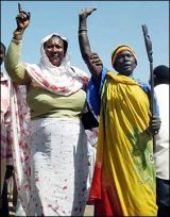Sudanese women demand greater inclusion in peace process
NAIROBI, May 17, 2005 (IRIN) — Women activists have demanded for more involvement in the implementation of the southern Sudanese peace process that followed the 9 January agreement between Khartoum and the Sudan People’s Liberation Movement/Army (SPLM/A).

|
|
Sudanese women, one from the north (L) and one from the south hold hands as they chant ‘sawa, sawa’ (together) during celebrations in Khartoum, 01 January 2005. (AFP). |
“Sixty-five percent of the people in the south are women,” Ancil
Adrian-Paul, gender and peace-building programme manager for the advocacy organisation International Alert, told IRIN during a meeting in the Kenyan capital, Nairobi.
“You can’t exclude them from the peace-implementation process. They need a voice in the new governing institutions, and in the wealth-sharing of resources,” Adrian-Paul said.
The activists were attending a workshop entitled “Inclusive Security – Sustainable Peace” which was organised by International Alert and the UN Development Fund for Women (UNIFEM), from 11-13 May.
The workshop was attended by representatives of women’s organisations from across East Africa who shared their experiences in conflicts in the region.
According to the activists, the Nairobi peace agreement, which ended 21 years of civil war in southern Sudan, should signal a new phase for the engagement of Sudanese women.
“A major problem with this peace agreement is that it is an agreement negotiated without the participation of other political parties or civil-society organisations in which more women are represented,” said Sonia Asis Malik, lecturer at Ahfad University for Women in Omdurman and member of the Babik Budri Scientific Association.
“Women were basically excluded from this peace agreement,” Malik added.
In addition, she noted, the power-sharing formula used for the creation of the transitional government and the various commissions to implement the agreement, such as the Constitutional Review Commission (CRC), only applied to political parties and not to civil-society organisations, marginalising the voice of women in these processes.
“At first, there where no women in the CRC,” she added. “Only after the gender symposium at the Oslo donor conference [in April] put pressure on the parties, were women admitted. There are now six or seven women on the commission, but only one is a lawyer.”
According to Malik, only six percent of the judges on Sudan’s High Court and 26 percent of the judges of the General Court are women.
“The judiciary needs to be restructured. It is not gender-sensitive, and last year only four of the 100 people admitted to the country’s judiciary were women,” Samia El Hashmi, chairwoman of Mutawint, a women’s organisation that focuses on legal issues, told IRIN.
Malik noted that at present, there were only two female ministers: one in the Ministry of Social Welfare and Social Development and the other in the Ministry of International Cooperation. There was no significant representation of women in strategic ministries, such as foreign affairs, finance and defense, she added.
Various Sudanese constitutions since independence had granted equal rights and duties to all Sudanese, irrespective of their origin, race, sex or religion.
“It is not practised and it will not be practised,” Malik said. “Since our independence, [the constitution] gives women rights with one hand and takes them with the other. A lot of discrimination also happens in the private sphere.”
Mary Cirillo Bang of the New Sudan Women’s Federation told IRIN that women and children had been most affected by the wars that raged in Sudan since 1955.
“When two elephants are fighting, the grass suffers,” she said. “Women and children are the grass.”
Bang noted that women had played a large role in intertribal
reconciliation efforts across southern Sudan, but they had been
excluded from the Nairobi agreement.
“We want to be involved in all commissions and all activities that will be implemented now that the peace agreement has been signed,” Bang added.
Nyaradzai Gumbonzvanda, UNIFEM regional programme director, told IRIN that the sustainability of women’s participation had to be measured in the improvement of women’s lives.
“They want to read and write, give birth in a clinic, have food on the table, be safe from sexual abuse, and be included in decision-making,” Gumbonzvanda said. “Peace means a different life. Women don’t want the stories of today to be the stories of tomorrow.”
The Nairobi agreement ended the war between the SPLM/A and the Sudanese government, which erupted in 1983 when rebels took up arms against authorities based in the north to demand greater autonomy. The fighting has killed at least 2 million people, uprooted 4 million more, and forced some 550,000 to flee to neighbouring countries.
